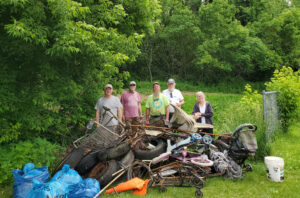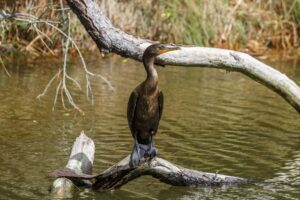Operation Dry Water will be taking place over the July 4th holiday
At the last Berkshire County League of Sportsmen’s meeting, Lt. Tara Carlow, of the Massachusetts Environmental Police reported that local officers will be closely monitoring our lakes and ponds over the July 4th weekend for boaters operating under the influence.
In fact, law enforcement officers across the country will be on heightened alert for those in violation of boating under the influence laws as part of the annual Operation Dry Water (ODW) weekend, July 2 – 4. ODW is a year-round boating-under-the-influence awareness and enforcement campaign focused on reducing the number of alcohol and drug-related incidents and fatalities. The U.S. Coast Guard, state, local and tribal law enforcement agencies, recreational boating safety advocates and the National Association of State Boating Law Administrators (NASBLA) are gearing up to spread awareness and prevent tragedies related to boating under the influence (BUI).
Alcohol use continues to be the leading contributing factor in recreational boating fatalities. Since the commencement of the ODW campaign in 2009, law enforcement officers across the nation have removed over 4,700 impaired operators from our nation’s waterways, preventing dangerous and potentially catastrophic consequences. Law enforcement agencies from every U.S. state and territory are expected to participate in the ODW campaign, focusing their efforts on detecting impaired boaters and educating the public about the dangers of BUI. In 2020, 620 agencies from every state and territory took part in the ODW weekend.
“Our mission is to ensure that everyone on the water has a safe and enjoyable experience,” says Tim Dunleavy, NASBLA Chair. “This means that all operators and passengers should choose to boat sober all season long. Boating under the influence is a 100% preventable crime. ODW, participating law enforcement agencies and our boating safety partners encourage boaters to stay safe by staying sober while boating.”
Not only is alcohol use dangerous for operators, but also presents hazards to passengers as well. Intoxication can cause slips, falls over board and other dangerous incidents. Where cause of death was known, nearly 80% of fatal boating incident victims drowned. Passengers under the influence are at-risk of serious injury and death, whether the boat operator is sober or impaired, and whether the boat is underway or not.
For more information about Operation Dry Water visit http://www.operationdrywater.org.
Incidentally, a local radio station interviewed Lt. Carlow last year and discussed such matters as ATV’s regulations, jet ski regulations, boating safety, what is allowed on boat ramps, no swimming in boat ramp areas, operating under the influence in boats and kayaks and the effects on their automobile drivers’ licenses. She also discussed bear complaints, leaving fawns alone and deer ticks.
The interview will be re-aired on WTBR 89.7 FM and PCTV on July 8th. Check your radio station listings for you won’t want to miss it. There is also a link to last year’s radio show at:
https://episodes.castos.com/5e471e591dc128-48970570/OnPatrolPodcast061121.mp3.
I listened to it, and am confident that you will enjoy and learn a lot from it.
Another link that explains the National initiative for Operation Dry Water is as follows:
https://www.nasbla.org/operationdrywater/home https://episodes.castos.com/5e471e591dc128-48970570/OnPatrolPodcast061121.mp3
Dead birds are being found throughout the state’s coastlines, Avian Flu suspected
“Over the past week, Massachusetts has seen a substantial uptick in reports of dead and dying seabirds, including eiders, cormorants, and gulls,” said MassWildlife State Ornithologist Andrew Vitz. “We are asking for the public’s help in reporting observations of sick shorebirds along the coastline. Prompt reporting will expedite testing and diagnosis in cooperation with our state and federal partners who have been monitoring HPAI for several years”.
MassWildlife, MA Department of Public Health and the MA Department of Agricultural Resources are advising the public to refrain from touching or removing birds from coastal areas that appear sick, injured or deceased. Impacted birds include seagulls, ducks, terns and cormorants. If anyone finds a wild sick, injured or dying seabird, they’re asked to file a report at mass.gov/reportbirds. For other species of wild birds, like songbirds, only report 5 or more birds at one location. If one finds a sick domestic bird, contact MDAR’s Division of Animal Health at 617-626-1795.
Both wild and domesticated birds can become infected with avian flu. While raptors, waterfowl and other aquatic birds and scavengers are most at risk for infection, any bird species is considered susceptible. Although birds may show no symptoms of infection, they also may die suddenly. Other symptoms include decreased energy, appetite and egg production, soft-shelled or misshapen eggs, swelling of the head, comb, eyelids, wattles and hocks, nasal discharge, diarrhea and an uncoordinated gait.”
“Avian Influenza rarely infects humans,” said State Epidemiologist Dr. Catherine Brown. “Although the risk is low, direct contact with infected birds or heavily contaminated environments can sometimes spread the disease to people. The public is urged not to handle or feed any birds suspected of being infected”.
Around 10,000 salmon stocked in the Quabbin Reservoir
Recently the MA Department of Fish and Game announced that thousands of landlocked salmon were stocked in the Quabbin Reservoir last month. The Massachusetts Division of Fisheries and Wildlife, (MassWildlife), restocked the reservoir with its annual allotment of 10,000 landlocked salmon raised at their Roger Reed Fish Hatchery in Palmer. The fish were stocked throughout the reservoir on May 24 and 25.
The Roger Reed Hatchery in Palmer is the only fish hatchery in the state that raises salmon. The other four raise trout, officials said.
The eggs originally come from Maine and are raised for 1.5 years, reaching eight to ten inches before being released into the reservoir. Once when they reach 15 inches, or about three years from now, can they be legally caught.
Land-locked salmon, which do not normally swim to the ocean, have been put into the Quabbin Reservoir for over 40 years.
According to MassWildlife, the Quabbin and Wachusett Reservoirs are the only two water bodies that have land-locked salmon. A primary reason is that there are smelt populations in them, which I suspect the salmon consider a delicacy.
Results of recent Hoosic River clean-up
According to John Burns, President of the Taconic Chapter of Trout Unlimited, volunteers did “pretty well” on the Hoosic River clean-up recently in spite of the fact that the predicted number of volunteers didn’t show up. They cleaned from the Alcombright Ball Fields at New Street, North Adams, down to the bridge at Protection Avenue, about a quarter mile. 
The Hoosic River Watershed Association (HooRWA) and the Hoosic River Revival (HRR) joined forces for this project.
Can you believe the amount of junk collected out of the river in that one quarter mile stretch? How can people treat our beautiful rivers this way?
So, what’s the DFW Western District folks up to these days.
Well, they have been pretty busy answering bear complaints. Some people still persist in putting out their bird feeders which predictably results in visitations by the bears. There are some people who are outright feeding them. One wonders if they are aware that at least one Berkshire County town has an ordinance against willfully feeding bears and another town is seriously considering doing the same. (We are not talking bird feeders here, but actually feeding them.) One wonders if they are aware that feeding a bear could actually result in an unhappy ending for that bear.
To quote MassWildlife, “Bears that are frequently fed may completely lose their fear of people. (They) may break into sheds, garages, cages, and homes in search of food. If a bear behaves in a way that is a threat to public safety, it may be euthanized.” “Many wild animals are attracted to bird feeders including wild turkeys and coyotes. Since bird feeders attract small mammals like squirrels, they can also attract animals like fishers and bobcats who prey upon the smaller animals”.
Last year, a neighbor of ours who has several bluebird houses lost all of their newly hatched bluebirds to the bears.
Please, don’t intentionally or indirectly feed the bears.
The staff of the DFW Western District is also busy:
- Banding eaglets (baby eagles). So far this year they have banded five of them.
- They will also be doing some goose banding this summer.
- They will be mowing the fields located in their Wildlife Management Areas. The mowing runs from June to October.

